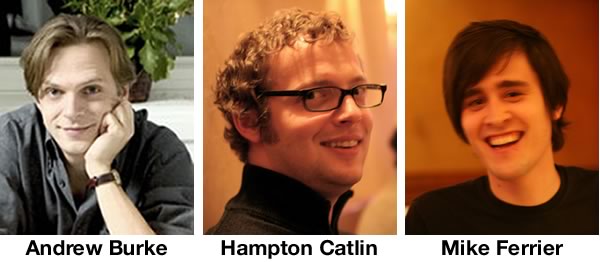
Update: This comic made some readers feel very sad, so please be advised that there is a follow-up comic.

Update: This comic made some readers feel very sad, so please be advised that there is a follow-up comic.
Rupert Murdoch on the Iraq War and oil prices, February 2003: “The greatest thing to come out of this for the world economy, if you could put it that way, would be $20 a barrel for oil. That’s bigger than any tax cut in the any country.”
Oil prices, today: About $100 a barrel.

BlogTO pointed to Mark Kingwell’s essay in The Walrus, Toronto: Justice Denied, which is subtitled Is Toronto being taken over by hucksters, fauxhemians, and the “knowledge economy”?.
Here’s an excerpt:
Suppose we are an idea city. Suppose being so means everyone is somehow better off. We could go on chasing our own tails as a leading creative city, but where would that get us? Where, in all the so-called creativity, is our idea of the idea that matters most in an idea economy? Again I ask, where is our idea of justice?
Surprisingly, given otherwise good intentions, we don’t talk about this. We talk about growth, about wealth, about real estate. We talk about sprawl, that great destroyer of common civic feeling, that anti-glue. From a combination of policy and economics, 5 million of us are now flung, barely coherent, across nearly 6,000 square kilometres of territory. We talk about cultural diversity and its challenges, whipsawing from self-congratulation to recrimination. We talk, sometimes, about beauty, or the sore lack of it on almost every corner of this vast, disorganized place. We talk about activism now and then, our utopian ideals aired in jaunty collections of optimistic DIY culture. We even talk about a subject close to justice, namely civility. This is, we might say, the symptomatic presentation of a deeper disease. How, despite a reputation for politeness, we are getting ruder and rougher by the day. How we never look at one another on the street. How we are all wrapped up in ourselves, 5 million small packages shunting along, back and forth, in the vast spiderweb of highways, subway lines, streetcar routes, and sidewalks. Symptom noticed. But what then?
Another excerpt:
Modern distributive models of justice rightly place emphasis on the fate of the least well off; in a non-distributive idea of justice, we can update and expand this idea: a city, like a people, shall be judged by how it treats its most vulnerable members. These may not necessarily be the poorest: consider the systematic disadvantage, in an idea economy, of truncated education, learning disability, and low access to the technologies of success. Torontonians talk about the value of otherness, celebrating cultural diversity in word, but they do not walk that walk. The smug inwardness of our de facto stealth neighbourhoods, the vertical gated communities of condo developments, the lifetime preoccupation with the averted gaze — all this shows city not confident enough to engage with itself. The gravity of downtown is reduced, as so often, to the cash nexus of shopping, democracy soured into a form of narcissistic pathology and sense of entitlement for a few, invisibility for the many. Race and class, poverty and hatred cannot find a point of intervention when the discursive space of the city is limited to surfaces.
One more snippet:
Though a city in pursuit of glory may neglect justice, the opposite does not hold: a truly just city is always a glorious one, because it allows greatness even as it looks to the conditions of strangeness posed by the other. It does not oppose development, including grandiose development, for the sake of some cramped sense of its own modesty; but it does demand, over and over, that all development be, at some level, in the service of everyone. Such a city starts with you, on the street, lifting your gaze and looking, for once, into the face of that person passing. This urban gaze is not male, or female; it is not casual or demeaning; it is not totalizing; it is liberating. It’s the gaze that recognizes, in the other, a fellow citizen, which is to say one who has vulnerabilities, desires, and ideas, just as you do.
I’ll have to give it another later on tonight and mull it over before commenting. Hey, Mark, you OpenCites, thoughts-on-urban-life kind of guy, what say you?
Riding the subway today, I saw a number of people still wearing winter coats and sweating bullets, despite the fact that we’re in the middle of an unusually warm January thaw. It was already 12 degrees C (about 54 degrees F) and will climb to 15 degrees C (just shy of 60 degrees F) by noon. Let the thermometer, not the calendar, be your guide.

Tonight is TSOT’s first monthly Ruby/Rails Project Night, where we invite the local developer community into our offices to see presentations on Ruby and Rails development and socialize. We’ve got a great lineup of speakers:
The event will take place at TSOT’s office — 151 Bloor Street West (on the south side, just east of Avenue Road), suite 1130. The doors open at 5:30 p.m., during which time we’ll serve food. Presentations start at 6-ish, with breaks in between and some time for socializing afterwards. Admission is free, but space is limited — to register, please email joey.devilla@tsotinc.com.

For the second time in a week, a group of Canadian Facebook users may have broken the law by publishing the names of youths charged under Canada’s Youth Criminal Justice Act. This law puts limitations on the publication of the identity of people charged under it; the basis for this is that revealing their names would be detrimental to rehabilitation and to public safety. The publication ban also applies to the identities of victims and witnesses in cases where people are charged under the act. There are exceptions to this gag order, such as in cases where the crime is transferred to adult court or if the youth court has found the accused guilty and imposed an adult sentence.
It happened with the first homicide of the year here in Toronto, in the case of a 14-year-old girl who was murdered on New Year’s Day. While newspapers, TV and radio stations and their associated websites complied with a 24-hour ban forbidding the publication of the victim’s name, some Toronto Facebook users created a memorial group in which both the victim and her two accused killers — a 17-year-old boy and 15-year-old — were named. The group was created by a 16-year-old who said “felt entitled to ‘pay attention’ to someone who was special to him and who had no idea he might have been violating the Youth Criminal Justice Act.
It happened again, this time in Alberta, where the names of four teenage boys accused of microwaving a cat to death were published in a Facebook group. Reactions were (understandably) harsh, with posted comments like “I think people like that should be shot”, “They will all get their faces smashed in by January 6th” and ” would say these monsters should be tortured, let society at them”.
These appear to be cases where technology has entered a grey area with the law. Referring to the case of the 14-year-old murdered in Toronto, a Toronto area constable said that “It’s a very good question if the people who post things on Facebook are actually breaking the YCJA. I guess it all boils down to whether Facebook is eventually determined by somebody that it is a publication.” In the story on the Alberta boys who accused of killing the cat, a British Columbia lawyer is of the opinion that the YCJA was broken and — as even someone at their first day of law school will tell you — ignorance of the law is no excuse.
My own opinion is that posting things online, whether in a blog, social network site, wiki or any other public online forum, is publication, even if you’re not doing it professionally. If online publishing gives you at least the same potential audience and reach as a city newspaper, then as an online publisher, you also have the same legal and ethical responsibilities that a city newspaper has.
Luckily for me, I worked at Crazy Go Nuts University’s main student newspaper, where we got brief on Canadian law and journalism and benefited from having one of the Globe and Mail’s lawyers do a regular Q&A session with us. I may not be able to quote chapter and verse of Canadian journo law, but I think I’ve can do a decent job at “sniff testing” to see if a posting will get me in legal hot water. I think that a number of bloggers — people who post articles on a regular basis — have made themselves familiar with the legal aspects of blogging, although I’m sure a number haven’t. Things can get hairy on online forums like Facebook, which is made for people who don’t publish regularly but do want some kind of online presence. On these places, users probably don’t think of themselves as publishers and might be unaware that they’re opening themselves up to charges of libel, defamation or violating the YCJA.
Paging Canadian lawyers who specialize in the internet — fellow neighbourhoodie Rob Hyndman, and friend-by-correspondence Michael Geist, I’m lookin’ at you! Do you know of any places where a Canadian blogger or Facebook user can find out more about the law and online publsihing?
This is amusing: BoingBoingBingo.net generates Bingo cards in which the squares contain the Boing Boing editors’ pet topics, which include:
[via Laughing Squid, which I found via Jeff “Coding Horror” Atwood’s Twitter stream; this was cross-posted to Global Nerdy.]